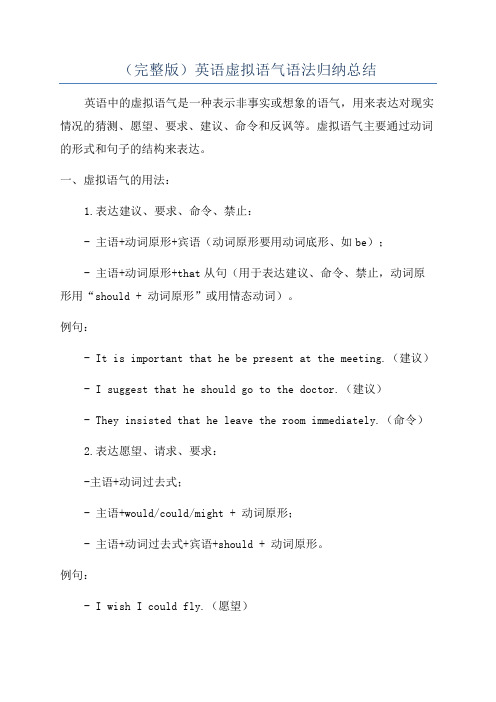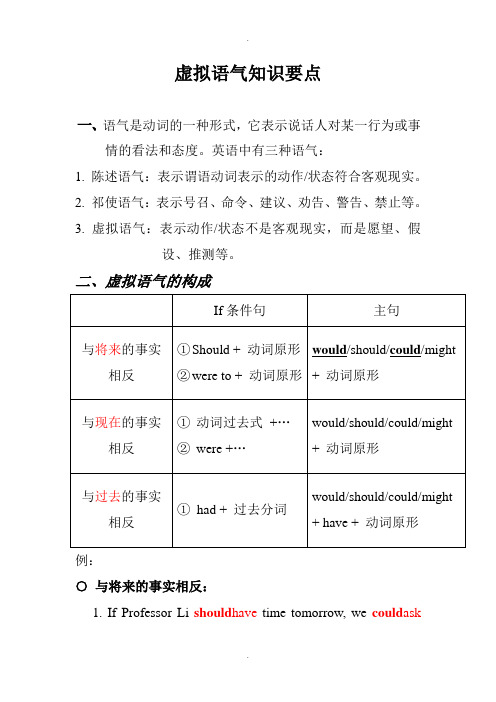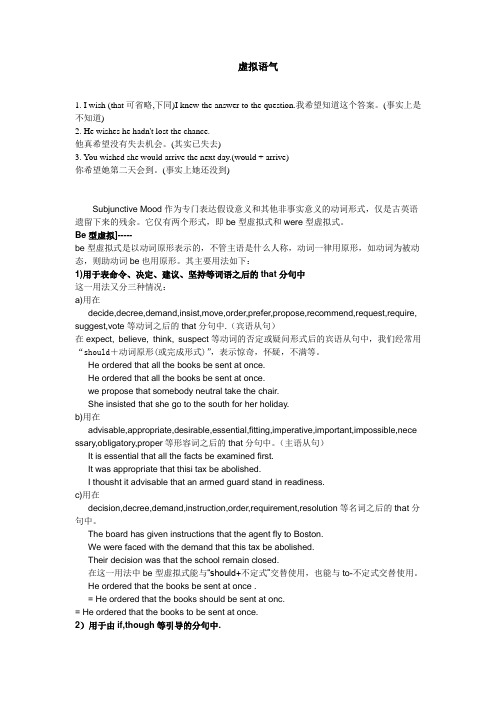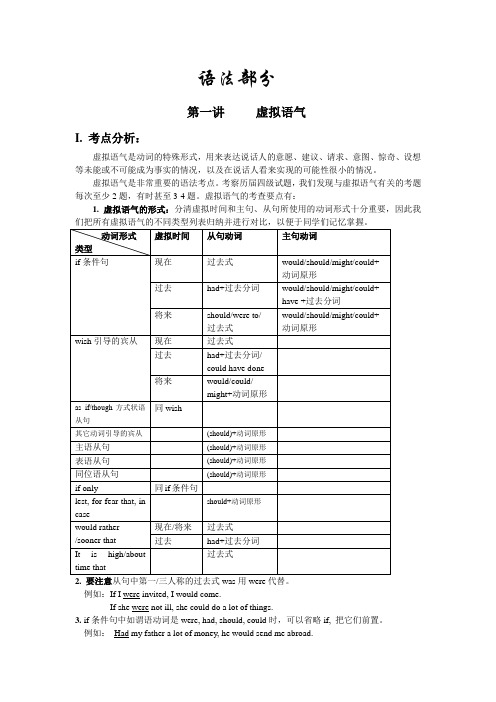大学英语语法--虚拟语气
虚拟语气用法总结

3.If it rained/should rain/were to rain tomorrow, I would stay at home.
Should it rained tomorrow/ Were it to rain tomorrow,
He hesitated for a moment before kicking the ball, otherwise he _____ a goal.
A.had scored B.scored C.would score D.would have scored
— Why didn’t you buy it? — I ______ but I didn’t have the money. A. would B. would have C. had had D. had bought
5.Without / But for your help, we couldn’t have finished the work ahead of time.
=If it had not been for your help, …
Without electricity, human being life ______ quite different today.
If you ______ with George earlier, you _____ so angry now.
A.talked; would not be B.had talked; would not be C.would talk; would not be D.had talked; would not have been
(完整版)英语虚拟语气语法归纳总结

(完整版)英语虚拟语气语法归纳总结英语中的虚拟语气是一种表示非事实或想象的语气,用来表达对现实情况的猜测、愿望、要求、建议、命令和反讽等。
虚拟语气主要通过动词的形式和句子的结构来表达。
一、虚拟语气的用法:1.表达建议、要求、命令、禁止:- 主语+动词原形+宾语(动词原形要用动词底形、如be);- 主语+动词原形+that从句(用于表达建议、命令、禁止,动词原形用“should + 动词原形”或用情态动词)。
例句:- It is important that he be present at the meeting.(建议)- I suggest that he should go to the doctor.(建议)- They insisted that he leave the room immediately.(命令)2.表达愿望、请求、要求:-主语+动词过去式;- 主语+would/could/might + 动词原形;- 主语+动词过去式+宾语+should + 动词原形。
例句:- I wish I could fly.(愿望)- I would appreciate it if you could help me.(请求)3.表示虚拟条件:- If条件从句中的谓语动词用过去完成时,主句用would/should/might/could + have + 过去分词;- If条件从句中的谓语动词用过去时,主句用would/should/could + 动词原形。
例句:- If I had known his phone number, I would have called him.(虚拟条件)- If you had listened to me, we could have finished the project earlier.(虚拟条件)4.表达建议、要求、祝愿:- If only内部称述 + 主语 + 过去式。
大学英语六级常考语法精讲虚拟语气

大学英语六级常考语法精讲虚拟语气高校英语六级常考语法精讲:虚拟语气六级常考语法之虚拟语气1. 表示现在/过去/将来状况的虚拟条件句虚拟条件句主要有三种结构:1) 表示与现在状况相反:主句谓语用would / could / might +动词原形,从句谓语用动词的一般过去时(动词be的过去式一律用were)。
If I were you, I would not accept his offer.If I had time, I would certainly go to the cinema with you.2) 表示与过去状况相反:主句谓语用would / could / might + have +过去分词,从句谓语用过去完成时。
If I had got up a little earlier, I wouldnt have missed the train.If I had been more careful, I might have passed that exam.3) 表示与将来状况相反:主句谓语用would / could / might +动词原形,从句谓语用were +动词不定式或should +动词原形。
If I were to do the job, I would not be able to have enough time to study.If it should rain tomorrow, I would not go out with you.2. 虚拟条件句连接词if的省略假如虚拟条件句的从句中含有were, had, should, could 等词时,可以省略连接词if,但这时必需把were, had, should, could等词移到主语前面,形成倒装。
这种句型主要用于书面形式。
Were I to do the job, I would finish doing it within two weeks.Had it not been for his help, we couldnt have arrived there on time.Should it rain tomorrow, I would stay at home.3. wish后宾语从句中的谓语构成动词wish后的宾语从句表示未实现的或不行能实现的愿望,其宾语从句中的谓语动词要用虚拟语气,有以下三种构成形式。
英语语法之虚拟语气

虚拟语气知识要点一、语气是动词的一种形式,它表示说话人对某一行为或事情的看法和态度。
英语中有三种语气:1.陈述语气:表示谓语动词表示的动作/状态符合客观现实。
2.祁使语气:表示号召、命令、建议、劝告、警告、禁止等。
3. 虚拟语气:表示动作/状态不是客观现实,而是愿望、假设、推测等。
二、虚拟语气的构成例:○与将来的事实相反:1.If Professor Li should have time tomorrow, we could askhim some questions.2.If there should be no air, there would be no living things.3.If it wereto snow tomorrow, they couldn’t goout.○与现在的事实相反:1. If it rained now, I wouldnotgo shopping.2. If I were a teacher, I wouldbe strict with my students.3. If it werenot for their help, we shouldbe in a very difficultposition.○与过去的事实相反:1. If I hade yesterday, I wouldhaveseen him.2. If we hadstarted earlier, we shouldnothavemissed thetrain.3. If she hadn’tbeen ill, she mighthavee.***请注意三种特殊情况:○上面的句子大多都可以改成倒装句,这时If就省略了,同学们要能识别出来。
如:1. Should there be no air, there wouldbe no living things.2. Were it not for their help, we shouldbe in a very difficultposition.3. Had she not been ill, she mighthavee.○错综时间条件句。
大学英语语法-虚拟语气

虚拟语气1. I wish (that可省略,下同)I knew the answer to the question.我希望知道这个答案。
(事实上是不知道)2. He wishes he hadn't lost the chance.他真希望没有失去机会。
(其实已失去)3. You wished she would arrive the next day.(would + arrive)你希望她第二天会到。
(事实上她还没到)Subjunctive Mood作为专门表达假设意义和其他非事实意义的动词形式,仅是古英语遗留下来的残余。
它仅有两个形式,即be型虚拟式和were型虚拟式。
Be型虚拟]-----be型虚拟式是以动词原形表示的,不管主语是什么人称,动词一律用原形,如动词为被动态,则助动词be也用原形。
其主要用法如下:1)用于表命令、决定、建议、坚持等词语之后的that分句中这一用法又分三种情况:a)用在decide,decree,demand,insist,move,order,prefer,propose,recommend,request,require, suggest,vote等动词之后的that分句中.(宾语从句)在expect, believe, think, suspect等动词的否定或疑问形式后的宾语从句中,我们经常用“should+动词原形(或完成形式)”,表示惊奇,怀疑,不满等。
He ordered that all the books be sent at once.He ordered that all the books be sent at once.we propose that somebody neutral take the chair.She insisted that she go to the south for her holiday.b)用在advisable,appropriate,desirable,essential,fitting,imperative,important,impossible,nece ssary,obligatory,proper等形容词之后的that分句中。
大学英语语法精讲【重点、考点全涵盖】

语法部分第一讲虚拟语气I. 考点分析:虚拟语气是动词的特殊形式,用来表达说话人的意愿、建议、请求、意图、惊奇、设想等未能或不可能成为事实的情况,以及在说话人看来实现的可能性很小的情况。
虚拟语气是非常重要的语法考点。
考察历届四级试题,我们发现与虚拟语气有关的考题每次至少2题,有时甚至3-4题。
虚拟语气的考查要点有:1. 虚拟语气的形式:分清虚拟时间和主句、从句所使用的动词形式十分重要,因此我2. 要注意从句中第一/三人称的过去式was用were代替。
例如:If I were invited, I would come.If she were not ill, she could do a lot of things.3. if条件句中如谓语动词是were, had, should, could时,可以省略if, 把它们前置。
例如:Had my father a lot of money, he would send me abroad.Could I do it, I would surely do it.Should the Black Death reappear, what should we do?(万一黑死病再次出现,我们该怎么办?)4. 错综时间的条件句是难点,如99年1月第60题: If I hadn’t stood under the ladder to catch you when you fell, you wouldn’t be smiling now.(从句用过去完成时,主句用现在进行时)又如:If I were you, I would have gone to the film last night.(从句虚拟现在,主句虚拟过去);If we hadn’t got everything ready by now, we should be having a terrible time tomorrow.(从句虚拟过去,主句虚拟将来);If the weather had been more favorable, the crops would be growing still better.(从句虚拟过去,主句虚拟现在)5. 虚拟句的另一难点是省略if条件句的含蓄条件句,如:I would have written the paper before, but I have been ill.(=If I had not been ill, I would have written the paper before.);A true friend would have acted differently. (=A friend, if he had been true, would have acted differently.)6. 注意介词短语without, but for, in the absence等表示虚拟条件。
英语语法 虚拟语气的知识点归纳
英语语法虚拟语气的知识点归纳英语语法:虚拟语气的知识点归纳虚拟语气是英语语法中的一个重要部分,它用于表达一种假设、愿望、建议、要求或可能性较小的情况。
在本文中,将对虚拟语气的几个主要知识点进行归纳总结。
1. 条件句中的虚拟语气在条件句中,虚拟语气通常用于表示与当前事实相反的情况。
虚拟语气的形式包括"would/could/should+动词原形",以及"动词过去式+动词原形"。
例如:- If I had more time, I would travel around the world.(如果我有更多时间,我就会周游世界。
)- If I were you, I would study harder.(如果我是你,我会更加努力学习。
)2. 虚拟语气用于表达愿望和建议虚拟语气还常用于表达愿望和建议,表示一种假设的情况。
常见的表达方式有:- I wish/If only + 主语 + 过去式(be动词用were):表示对现在或将来的希望或遗憾。
例如:- I wish I were taller.(我希望自己更高。
)- If only she could speak fluent English.(要是她能说一口流利的英语就好了。
)- It is time + 主语 + 过去式(should + 动词原形):用于表示现在或将来应该发生的动作。
例如:- It is time we started the meeting.(是时候开始会议了。
)- It is time you should apologize to her.(你应该向她道歉了。
)3. 虚拟语气在宾语从句中的使用在宾语从句中,若主句的动词表达了建议、命令、要求等含义时,宾语从句中的谓语动词常使用虚拟语气。
具体的用法如下:- 建议:suggest/recommend + (that) + 主语 + (should)+ 动词原形。
大学英语语法重点
二、may can might could 的异同
1. May / might 事实上的可能 2. Can / could 理论上的可能
The road may be blocked. The road can be blocked. Can he tell a lie? Yes, he may. 3. Not 否定 may /might, 否定的是句子中的主动词。 They may / might not get there on time tomorrow. They can / could not get there on time tomorrow.
三、做状语 –ing/ to
1. In order to, so as to, only to, too…to.., so … as to… 2. 悬垂
Going home, mother cooked a good meal. 3. 独立主格
Weather permitting, we will go for a picnic tomorrow. 4. -ing/-ed 主动 被动
Ought to 与should 基本类似,但强调责任、义务、应该做, 或者逻辑上的必然性时用ought to
As a student you ought to study hard. I think I should try to lose some weight. It is starry tonight; it ought to be a fine day tomorrow.
3. needn’t have done Since the meeting has been canceled, they needn’t
虚拟语气英语知识点总结
虚拟语气英语知识点总结一、虚拟语气的概念。
虚拟语气是一种特殊的动词形式,用来表示说话人所说的话不是一个事实,而是一种假设、愿望、怀疑、猜测或建议等。
二、虚拟语气在条件句中的用法。
1. 与现在事实相反的虚拟条件句。
- 结构:从句(If + 主语+ 动词的过去式(be动词一般用were)),主句(主语+ would/should/could/might+动词原形)。
- 例如:If I were you, I would study harder.(如果我是你,我会更努力学习。
实际上我不是你)2. 与过去事实相反的虚拟条件句。
- 结构:从句(If+主语+had+过去分词),主句(主语+would/should/could/might + have+过去分词)。
- 例如:If he had taken my advice, he would have passed the exam.(如果他听了我的建议,他就会通过考试了。
实际上他没听建议,也没通过考试)3. 与将来事实相反的虚拟条件句。
- 结构:从句(If+主语+动词的过去式/should+动词原形/were to+动词原形),主句(主语+would/should/could/might+动词原形)。
- 例如:If it rained tomorrow, we would stay at home.(如果明天下雨,我们就会待在家里。
明天是否下雨还不确定,但这是一种假设情况)- 或者If he should come tomorrow, I would tell him the news.(如果他明天来,我就会告诉他这个消息)- 以及If I were to see her tomorrow, I would give her the book.(如果我明天见到她,我就会把书给她)三、虚拟语气在宾语从句中的用法。
1. wish后的宾语从句。
- 表示与现在事实相反的愿望,从句谓语动词用过去式(be动词用were)。
英语语法——虚拟语气
虚拟语气的用法总结语气:语气是动词的一中形式,它表示说话人对某一行为或事情的看法和态度。
语气的种类:(1)陈述语气表示动作或状态是现实的,确定的或符合事实的,用于陈述句,疑问句和某些感叹句。
如We are ready. What a fine day it is!(2)祈使语气表示说话人的建议,请求,邀请,命令等。
如Open the door, Please.应注意以下几点:1、主语通常是第二人称you,但多不出现,动词用原形,否定用do not 或者don't 加动词原形(或be)如Be careful next time. Don't smoke here.2、有时为了强调,主语也可以出现,而且可以是第三人称,谓语动词不加-s或者-es 如You be quiet. He stand up.3、祈使语气可以用do加强语气如Do come to see this Sunday.4、在Let's 的祈使句后,疑问部分通常用shall we;在Let us后,疑问部分用will you 如Let's go out for a walk after supper,shall we? /Let us clean our classroom, will you?5、祈使句与连词and连用时相当于一个条件句,而and之后则是表示结果。
如Think hard and you will have a good idea.(3)虚拟语气表示动作或状态不是客观存在的事实,而是说话人的主观愿望,假设或推测等。
如If I were you, I should study English.一.虚拟语气在条件从句的用法条件句有两类,一类是真实条件句;一类是非真实条件句,也就是虚拟条件句。
如果假设的情况是有可能发生的,就是真实条件句,谓语要用陈述语气。
如If it doesn't rain tomorrow, we will go to the park.如果假设的情况是过去或现在都不存在的,或将来不大可能发生的,则是虚拟条件句。
- 1、下载文档前请自行甄别文档内容的完整性,平台不提供额外的编辑、内容补充、找答案等附加服务。
- 2、"仅部分预览"的文档,不可在线预览部分如存在完整性等问题,可反馈申请退款(可完整预览的文档不适用该条件!)。
- 3、如文档侵犯您的权益,请联系客服反馈,我们会尽快为您处理(人工客服工作时间:9:00-18:30)。
虚拟语气在含蓄条件句中的使用
1、用with,without等介词短语,分词短语或者独立主 格结构来替代条件从句。 例如:we might have died without your help.
• 例:It is strange that he (should) go himself.
•
真奇怪,他怎么自己独自去呢。
2、在主语从句中的用法
• 句型2、It is a pity (a shame , no wonder ,an honour) +that +主语+should(可省)+V(动词 原形)
非真实条件句
现在时 过去时 将来时 过去将来时
过去时
该用现在时时,用过去时
过去完成时
该用过去时时,用过去完成时
过去将来时
该用将来时时,用过去将来时
过去将来完成时 该用过去将来时时,用过去将来完成 时
与现 在事 实相 反
与过 去事 实相 反
与将 来事 实相 反
从句 过去时
were If +主语+ did
• ③省略if时,主语与were, had, should 的位置必须相互调 换。
• 例:If I should meet her, I would tell her.
•
=should I meet her, I would tell her.
•
If I were in your position, I would do it
上周我很忙,否则(如果我不忙的话)我会去看你的。
虚拟语气在含蓄条件句中的使用
• 通过上下文来表示虚拟情况,需要具体加以分析 • 例:I would have given you more money, but
I was so poor then.
那时我应该再多给你些钱,可是那时我很穷。
这句话实际省略了一个非真实条件句—“if I had more money , or if I were/was rich.” but 引 导的句子是真实情况,不是虚拟。这句如果写全应 是:
错综时间条件句
• 有时在非真实条件句中,主句谓语动词所表示的
动作,和从句谓语动词所表示的动作并不同时发生, 这时动词的形式并不完全按照上述表格来进行,而 需按照各自的时间来调整,这样的句子叫做错综时 间条件句。
错综时间条件句
比较: 主句与从句发生的时间不同
If you had followed the doctor’s advice, you would be all right now. 如果你那时听医生的话,你现在已经好了。 从句:过去时 主句:现在时 主句与从句发生的时间相同
பைடு நூலகம்
better.
•
=Were I in your position ,I would do it better.
•
二、虚拟语气在从句中的用法
1、在宾语从句中的用法
• ①在suggest,insist,order,demand,request, command,propose,desire等动词后作宾语从句,表示欲 望,建议,命令等时,用虚拟语气。
用现在时代替将来时
If it doesn’t rain tomorrow, 如果明天不下雨, If anybody visits, 如果有人来访,
主句
现在将来时或将来时
it turns(=will turn) to water。 它就变成水。 he will miss the bus. 他就要误了车。
真实条件句
从句
现在的 条件
过去的 条件
将来的 条件
现在时
If you heat ice, 如果你给水加热, If he doesn’t hurry up, 如果他不快点,
过去时
When he was a child, 当他还是个孩子的时候, He said that if he had money 他说,如果他有钱,
如果我们及时知道的话,我们就有可能阻止它。
虚拟语气在含蓄条件句中的使用
I had my hair cut off and sold it because I couldn’t have lived through Christmas without giving you a present.
= if I hadn’t given you a present 我剪掉了头发,并把它卖了,因为如果我不给你礼物 的话,整个圣诞节我都不会好过的。
=we might have died if you hadn’t helped us. 如果没有你们的帮助,我们早就死了。
Having known in time, we could have stopped it. =if we had known in time, we could have stopped it.
• I would have given you more money , If I was rich then. But I was so poor then.
虚拟条件句中的省略和倒装
• 若符合下面条件,可以省略if:
• ①必须是非真实条件句,真实条件句不可省略if。
• ②只有当非真实条件句中有were, had, should, would等 词时,才可以省略if。
• 句型 主语+(should)+动词原形 • 例如:
He proposes that we (should) work out a plan first. 他建议我们先定一个计划。
1.在宾语从句中的用法
• 注意:suggest 的用法 • 当表示“建议”时,后面的宾语从句才是虚拟语气 • He suggest that she should leave the house at once. • 当表示“暗示”“略微透露”“表明”时,后面的宾语从句
should/would
主语+
have done
might/ could
You would have caught the bus. 你就会赶上那两公共汽车。
过去将来时
should/ would do 主语 +
might/ could do
We wouldn’t have an exam. 我们就不参加考试。 You would say ‘hello’ to him. 请向他问好。
1.在宾语从句中的用法
• 注意:wish和hope的区别 • wish+从句,表示的是不可能实现的愿望,从句必
须是虚拟语气。
• hope+从句,表示的是有可能实现的事实,从句不能 用虚拟语气
2、在主语从句中的用法
• 用necessary等词,表示建议,要求,惊奇等时, 要用虚拟语气。
• 句型1、It is natural (suggested, necessary, requested, ordered, proposed, important, surprising, strange, funny )+that+主语+should (可省)+V(动词原形)
• 例:My suggestion is that we (should) do the
experiment.
(表语从句)
• 我的建议是再做一次实验。
• My suggestion that we (should) do the experiment
虚拟语气 Subjunctive Mood
组员:
content
1
总述
2 虚拟语气在条件句中的用法
3 虚拟语气在从句中的用法
总述
• 什么是虚拟语气? 虚拟语气是一种动词形式,表示说话人的
一种意愿,假设,怀疑,猜测,建议等含义。 虚拟语气所示的不是客观存在的事实。
一、虚拟语气在条件句中的用法
• 条件句分为两类: • 一类可能成为现实的情况,称为真实条件句。
If it were Sunday tomorrow, 明天要是周日的话, If you should meet him, 如果你要见他,
主句 过去将来时
should/would do 主语+
might/ could do
I should /would go at once. 我立刻就走。
过去完成将来时
过去时或过去将来时
he asked me to tell stories. 他就让我讲故事。 he would buy me a car. 他就会给我买辆小汽车。
一般将来时或祈使句
he will go to the park. 他就去公园。 ask him to wait a while. 请让他等一会。
were doing
If I were you, 如果我是你,
过去完成时
If +主语+had done…
If you had got there earlier, 如果你早点到的话,
过去时(were to); should + V
were If + 主语+ did
were to do If + 主语+ should do
虚拟语气在含蓄条件句中的使用
2、用相当于if的其他连词表示虚拟结构在条件句中除常见的
连词if之外,尚有下列连词:
• Otherwise否则,不然…
